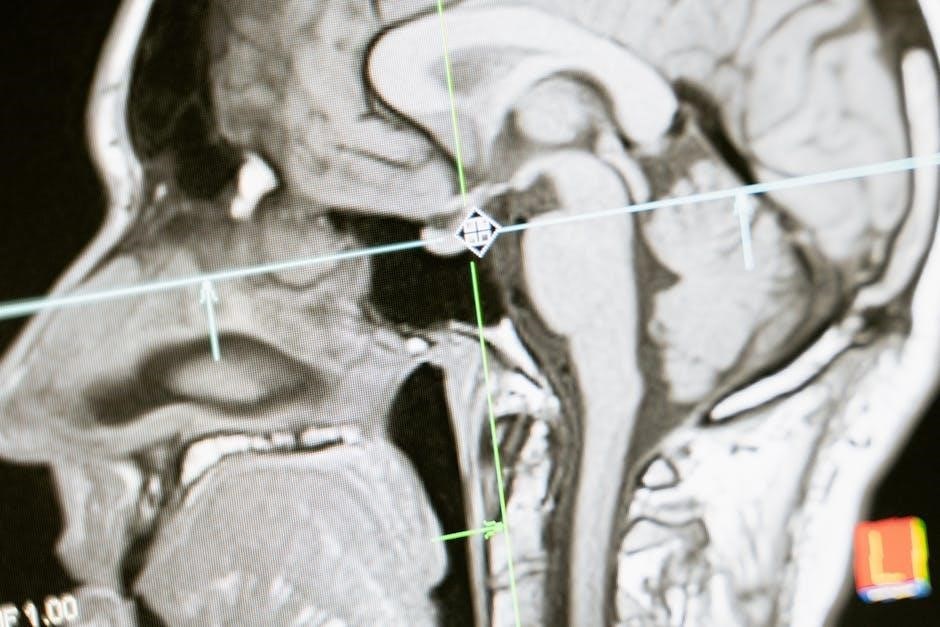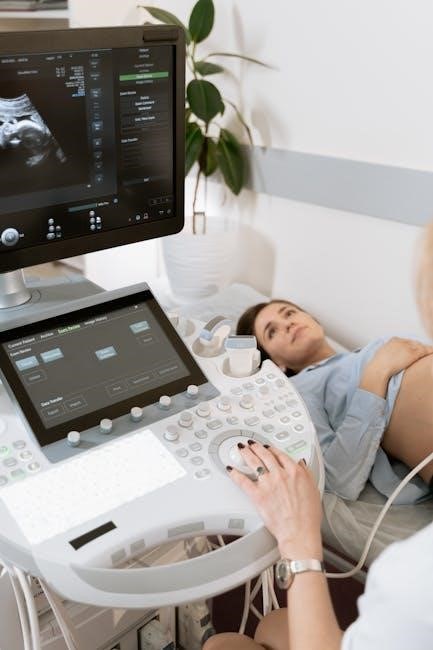Algebra Readiness Tests are diagnostic tools designed to assess mathematical skills and problem-solving abilities essential for success in algebra. These tests evaluate foundational concepts‚ identifying strengths and areas needing improvement‚ ensuring students are prepared for advanced algebraic studies.
1.1 Importance of Algebra Readiness Tests
Algebra readiness tests are crucial for assessing whether students possess the necessary arithmetic and problem-solving skills to excel in algebra. These tests identify gaps in foundational math knowledge‚ ensuring students are adequately prepared before advancing to more complex algebraic concepts. By evaluating numerical skills‚ equation solving‚ and algebraic expressions‚ readiness tests help educators tailor instruction to individual needs‚ fostering a smoother transition to higher-level mathematics and preventing future academic challenges.
1.2 Purpose of Algebra Readiness Assessments
The primary purpose of algebra readiness assessments is to determine a student’s mathematical proficiency and preparedness for algebra. These tests evaluate skills such as solving equations‚ working with integers and fractions‚ and understanding algebraic expressions. By identifying strengths and weaknesses‚ educators can provide targeted support‚ ensuring students are well-equipped to succeed in algebra and beyond. This diagnostic approach fosters a strong foundation‚ enabling effective learning and future academic success in mathematics.

Key Topics Covered in Algebra Readiness Tests
Algebra readiness tests cover essential math skills‚ including arithmetic operations‚ solving linear equations‚ working with integers and fractions‚ and understanding algebraic expressions. These foundational topics ensure readiness for advanced algebraic concepts.
2.1 Basic Arithmetic Skills
Basic arithmetic skills form the cornerstone of algebra readiness tests‚ focusing on operations with integers‚ fractions‚ and decimals. Proficiency in addition‚ subtraction‚ multiplication‚ and division is crucial. These tests also assess understanding of number properties‚ such as even and odd numbers‚ prime factors‚ and place value. Mastery of these skills ensures a solid foundation for more complex algebraic concepts‚ making them a critical component of readiness assessments.
2.2 Solving Linear Equations
Solving linear equations is a fundamental aspect of algebra readiness tests‚ requiring students to simplify expressions and isolate variables. These problems often involve integers‚ fractions‚ and basic operations‚ testing the ability to rearrange terms and solve for unknowns. Linear equations help students understand the relationship between variables and constants‚ laying the groundwork for more complex algebraic problem-solving. Proficiency here is essential for tackling real-world applications and advanced mathematical concepts.
2.3 Working with Integers and Fractions
Mastering operations with integers and fractions is crucial for algebra readiness. Tests typically include problems on adding‚ subtracting‚ multiplying‚ and dividing integers and fractions‚ as well as converting between different representations. Students are also assessed on their ability to compare and order these numbers‚ understand positive and negative values‚ and apply these skills in solving equations. This foundational knowledge ensures a smooth transition to more complex algebraic concepts later on.
2.4 Understanding Algebraic Expressions
Understanding algebraic expressions is a cornerstone of algebra readiness. Tests assess the ability to interpret‚ simplify‚ and evaluate expressions involving variables and constants. Key skills include applying order of operations‚ combining like terms‚ and recognizing patterns. Students are also evaluated on rewriting expressions in different forms and identifying equivalent expressions. Proficiency in these areas ensures a solid grasp of algebraic fundamentals‚ enabling students to tackle more complex problems with confidence and accuracy.

Sample Questions and Practice Tests
Sample questions and practice tests provide essential preparation for algebra readiness assessments. They cover numerical skills‚ geometry‚ and word problems‚ mirroring actual test formats and content. These resources help students identify areas for improvement and build confidence in solving algebraic problems. Regular practice with these materials ensures familiarity with question types and enhances problem-solving strategies.
3.1 Numerical Skills and Pre-Algebra Questions
Numerical skills and pre-algebra questions form the backbone of algebra readiness tests. These questions assess proficiency in basic arithmetic operations‚ including integers‚ fractions‚ decimals‚ and exponents. Students are also evaluated on their ability to solve simple equations and manipulate algebraic expressions. Pre-algebra topics such as evaluating expressions‚ solving linear equations‚ and understanding ratios are commonly included. These questions ensure students have a strong foundation before advancing to more complex algebraic concepts. Regular practice with these types of problems helps identify strengths and weaknesses‚ enabling targeted preparation and improvement.
3.2 Geometry and Measurement Problems
Geometry and measurement problems in algebra readiness tests evaluate spatial reasoning and numerical skills. Questions often involve calculating lengths‚ areas‚ and volumes of various shapes‚ such as triangles‚ rectangles‚ and cylinders. Problems may also include interpreting graphs‚ understanding angles‚ and applying the Pythagorean theorem. These exercises ensure students can visualize geometric relationships and apply mathematical principles to real-world scenarios‚ bridging the gap between arithmetic and algebraic thinking.
3.3 Word Problems and Real-World Applications
Word problems and real-world applications in algebra readiness tests help students connect mathematical concepts to practical scenarios. Questions often involve budgeting‚ cooking‚ or travel‚ requiring students to translate verbal descriptions into algebraic expressions. These problems enhance critical thinking and problem-solving skills‚ preparing students to apply algebra in everyday situations. Examples include calculating distances‚ mixing ingredients‚ or determining costs‚ ensuring a strong foundation for tackling complex‚ real-world challenges with confidence and accuracy.

How to Assess Readiness for Algebra
Assessing algebra readiness involves evaluating mathematical skills through diagnostic tests‚ identifying strengths‚ and addressing weaknesses. These tests measure problem-solving abilities‚ ensuring students are prepared for advanced algebraic concepts and applications.
4.1 Diagnostic Tests and Evaluation Criteria
Diagnostic tests for algebra readiness evaluate foundational math skills‚ such as solving equations‚ working with integers‚ and understanding algebraic expressions. These tests use multiple-choice questions‚ problem-solving tasks‚ and real-world applications to assess a student’s readiness. Evaluation criteria focus on accuracy‚ problem-solving strategies‚ and the ability to apply mathematical concepts. The results help teachers identify areas where students may need additional support before advancing to algebra.
4.2 Interpreting Test Results
Interpreting algebra readiness test results involves analyzing scores to identify a student’s strengths and weaknesses. High scores in numerical skills indicate strong arithmetic foundations‚ while lower scores may highlight areas needing review. Teachers use these insights to tailor instruction‚ ensuring students grasp essential concepts before progressing. Results also guide placement decisions‚ helping to create personalized learning plans that address specific skill gaps and foster confidence in algebraic problem-solving.
4.3 Identifying Strengths and Weaknesses
Algebra readiness tests help identify students’ strengths and weaknesses by evaluating their performance in key areas‚ such as numerical skills‚ equation solving‚ and problem-solving. High scores in specific sections indicate strong understanding‚ while lower scores highlight areas needing improvement. This analysis enables targeted support‚ allowing teachers to refine instruction and students to focus on skill development‚ ultimately building confidence and readiness for advanced algebraic concepts.

Preparation Strategies for Algebra Readiness
Effective preparation for algebra readiness involves consistent practice‚ mastering arithmetic skills‚ and utilizing online resources. Focused study techniques and building a strong foundation in math basics are essential.
5.1 Effective Study Techniques
Effective study techniques for algebra readiness include consistent practice‚ breaking problems into manageable steps‚ and leveraging online resources. Setting specific goals‚ like mastering one concept at a time‚ enhances focus. Regular review of mistakes and understanding underlying principles ensures long-term retention. Utilizing flashcards for key formulas and scheduling dedicated study times also improves readiness. Balancing practice with conceptual understanding fosters confidence and proficiency in algebra.
5.2 Utilizing Online Resources and Practice Tests
Online resources and practice tests are invaluable for algebra readiness. Websites offer interactive tools‚ video tutorials‚ and downloadable PDF guides. Taking timed practice tests simulates exam conditions‚ improving time management and reducing anxiety; Platforms like Khan Academy and Mathway provide personalized feedback‚ while algebra readiness test PDFs offer printable exercises for offline study. These tools help identify weak areas and track progress‚ ensuring comprehensive preparation for algebra assessments.
5.3 Building a Strong Foundation in Math Basics
A strong foundation in math basics is crucial for algebra success. Mastery of arithmetic operations‚ fractions‚ and integers ensures readiness. Regular practice with problem-solving strategies and real-world applications reinforces understanding. Focused study on number properties and basic algebraic expressions builds confidence and proficiency‚ preparing students for more complex concepts in algebra.

The Role of Placement Tests in Algebra Readiness
Placement tests evaluate students’ math skills to determine their readiness for algebra. They cover key areas like integers‚ fractions‚ and equations‚ ensuring proper course placement for success.

6.1 Placement Exam Formats and Content
Placement exams for algebra readiness typically feature multiple-choice questions‚ covering arithmetic‚ integers‚ fractions‚ and basic algebra. Tests are timed‚ often containing 50 problems within 45 minutes. Content includes solving linear equations‚ simplifying expressions‚ and applying mathematical reasoning; Some exams also incorporate word problems to assess real-world application skills. The format ensures a comprehensive evaluation of a student’s readiness‚ helping educators place them in appropriate courses for their skill level.
6.2 How Placement Tests Determine Readiness
Placement tests determine algebra readiness by evaluating a student’s mastery of fundamental math skills. Scores indicate proficiency levels‚ identifying whether a student can proceed to algebra or needs additional preparation. Correct answers assess understanding of integers‚ fractions‚ and equations. The evaluation criteria ensure accurate placement‚ providing insights into strengths and areas requiring improvement. This data helps educators tailor instruction to individual needs‚ fostering academic success in algebra and beyond.
6.3 Benefits of Placement Testing for Students
Placement testing offers numerous benefits for students‚ ensuring they are appropriately placed in algebra courses based on their skills. It prevents under-challenge or overwhelm‚ fostering confidence and motivation. By identifying knowledge gaps‚ tests guide focused study‚ enhancing readiness for algebra. Personalized learning paths and tailored support improve academic outcomes‚ ensuring students build a strong foundation for future success in mathematics.

Technology and Algebra Readiness Tests
Technology enhances algebra readiness through online platforms offering practice tests and interactive tools. These resources provide personalized feedback‚ improving problem-solving skills and preparing students for algebraic concepts effectively.
7.1 Online Platforms for Algebra Readiness Tests
Online platforms provide accessible algebra readiness tests‚ offering interactive tools and practice resources. These platforms feature multiple-choice questions‚ progress tracking‚ and personalized feedback. Many include diagnostic tests to identify strengths and weaknesses. Resources like the Arithmetic/Algebra Readiness Sample Test and Algebra Readiness Diagnostic Test are widely available. These tools help students prepare for algebra by addressing foundational math skills and problem-solving strategies‚ ensuring a smooth transition to advanced studies.
7.2 Interactive Tools for Math Practice

Interactive tools enhance math practice by offering dynamic exercises and real-time feedback. Platforms provide step-by-step solutions and video tutorials‚ aiding in understanding complex concepts. These tools often include gamified elements to engage students and track progress. Resources like algebra readiness workbooks and online diagnostic tests are integrated to simulate actual exam conditions‚ helping students build confidence and proficiency in algebraic problem-solving through hands-on practice and immediate assessment.
7.3 The Future of Algebra Assessments
The future of algebra assessments lies in advanced technologies like AI-driven adaptive testing and immersive virtual learning environments. These tools will offer personalized feedback and real-time progress tracking. Interactive platforms will simulate real-world math problems‚ enhancing problem-solving skills. Additionally‚ voice-activated and visually enhanced interfaces will make algebra more accessible. Future assessments will focus on practical applications‚ ensuring students grasp algebra’s relevance in everyday life and career opportunities.
Algebra readiness tests are crucial for identifying student strengths and weaknesses. Utilizing online resources and practice tests can significantly enhance preparedness. Mastering foundational math skills ensures future success.
8.1 Final Tips for Success
Consistent practice and understanding basic math concepts are key to excelling in algebra. Utilize online resources and practice tests to identify weaknesses. Regularly review mistakes to improve problem-solving skills. Stay positive and build confidence through incremental progress. Leveraging study guides and seeking feedback from teachers can enhance readiness. A strong foundation in arithmetic and pre-algebra ensures long-term success in algebraic studies;
8.2 Encouraging Lifelong Math Skills
Fostering a positive attitude toward math is crucial for long-term success. Encourage students to view challenges as opportunities for growth. Integrating real-world applications helps students appreciate the relevance of algebra. Regular practice and celebrating progress build confidence. Educators and parents play a vital role in nurturing curiosity and persistence‚ ensuring math skills evolve into a lifelong asset. This mindset prepares students for future academic and professional endeavors.

